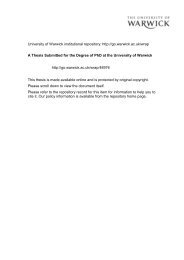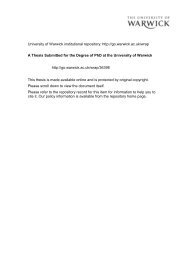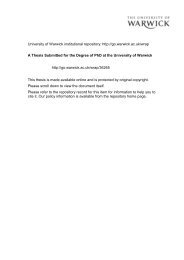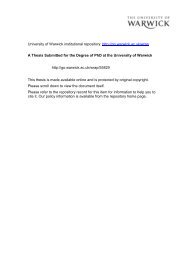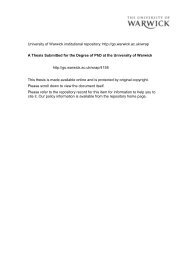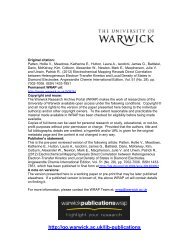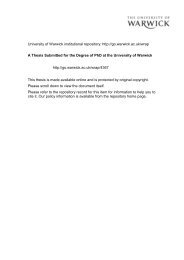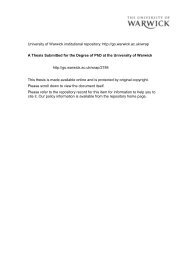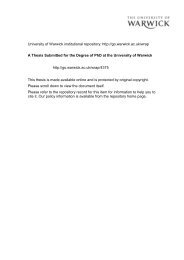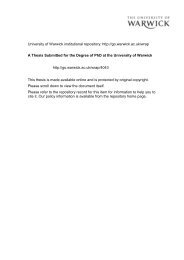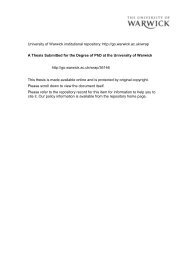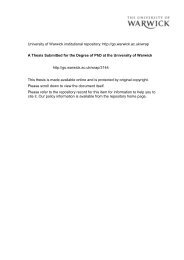Download (13Mb) - WRAP: Warwick Research Archive Portal ...
Download (13Mb) - WRAP: Warwick Research Archive Portal ...
Download (13Mb) - WRAP: Warwick Research Archive Portal ...
You also want an ePaper? Increase the reach of your titles
YUMPU automatically turns print PDFs into web optimized ePapers that Google loves.
ii. On the edge of a marginal genre<br />
The fantastic presents Italian women writers with the ideal means with which to<br />
foreground their ex-centric relationship with the canon, in a language that conveys<br />
spatial anxiety and exploration. As I will show in this section the fantastic has always<br />
been a politically awkward genre in Italy and doubly so for the female writer, the<br />
effects of whose late arrival are still felt today. Until the post-war period the fantastic<br />
was regarded as having even fewer female practitioners than male ones. Writing<br />
within it allows contemporary women to stand as close to the edge ofliterary tradition<br />
as possible without disappearing, and thus question the boundaries ofthat territory.<br />
ii.i. The Fantastic in Italy<br />
Cornwell's definition of the fantastic as intertextual is particularly pertinent to Italy<br />
where a new attention to the genre has been provoked by a 'singolare fioritura'115<br />
within the postmodern re-vitalizing of old forms. Thus although there exist few<br />
comprehensive studies of the nineteenth and twentieth century fantastic in<br />
Italy,116there are rather more recent articles concerning its postmodem flowering and<br />
the development of theories of the fantastic.'!" The whole is infused with the feeling<br />
that, having missed out on the nineteenth century fantastic, Italy has never really<br />
measured up to the genre's historic development in other European countries (namely<br />
England, France and Germany) and the United States until the present day. It is an<br />
issue that will never be completely clarified since the genre's history in Italy makes it<br />
difficult to distinguish between cause and effect, between an original real lack of<br />
lIS Ghidetti and Lattarulo, p.vii.<br />
116 See Neuro Bonifazi, Teoria del 'fantastico' e il il raeeonto 'fantastico' in ltalia: Tarchetti<br />
Pirandello-Buzzati (Ravenna: Longo, 1982); Monica Fametti, 1/ giuoco del maligno. 1/ raeeonto<br />
fantastieo nella letteratura italiana tra Otto e Noveeento (Firenze: Vallecchi, 1988); Giovanna<br />
Desideri, 'II fantastico' in Letteratura Italiana. Storia e geografia. III edited by Albert Asor Rosa<br />
(Torino: Einaudi, 1989), pp.969-998.<br />
117 In 'Percorsi del fantastico nella narrativa degli anni '80' Antonio Corsaro speaks ofa 'la quasi totale<br />
assenza di fondamenti teorici' (p.57), which has only recently been partially compensated for in recent<br />
years by 'l'essenziale fioritura di studi teorico-critici che negli stessi anni di cui ci occupiamo ha<br />
visibilmente diminuito il deficit rispetto alIa situazione d'Oltralpe', even tentatively suggesting 'se non<br />
una dipendenza, almeno un significativo collegamento tra la scrittura creativa dell'oggi e quella nuova<br />
disponibilita di supporti teorici'(p.58). This particular 'fioritura' includes: La narrazionefantastiea ed.<br />
by Ceserani and others; I piaeeri dell'immaginazione ed. by Pisapia; A. Scarsella, 'Profilo delle<br />
poetiche del Fantastico' in Rassegna della letteratura italiana' ed. by V.Branca and C.Ossola (Firenze:<br />
Vallecchi, 1988); II punto su: la letteraturafantastiea ed. by Silvia Albertazzi (Rome: Editori Laterza,<br />
1995); Geografia, storia e poetiea del fantastieo ed. by Fametti; Stefano Lazzarin, Il modo fantastieo<br />
41




